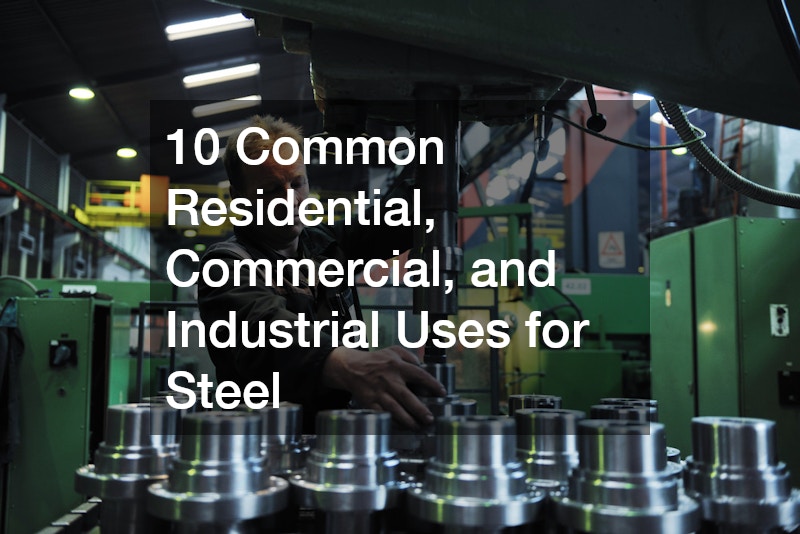
Steel’s significance as one of the most indispensable materials in modern construction and manufacturing cannot be overstated. Known for its remarkable strength, durability, and versatility, steel is used across residential, commercial, and industrial sectors. From towering skyscrapers to compact home appliances, steel provides the structural integrity and resilience required to withstand both time and external stresses.
The uses for steel are vast due to its unique properties like corrosion resistance, ductility, and weldability. Advanced forms of steel, such as carbon steel and stainless steel, have further expanded the material’s application in specialized industries. Whether it’s a local garage door service or large-scale construction projects, steel plays a crucial role in improving safety, efficiency, and longevity.
This article aims to explore 10 common uses for steel spanning residential, commercial, and industrial sectors. We will delve into how steel contributes to garages, skyscrapers, the aerospace industry, automotive manufacturing, roofing, the energy sector, auto repair, signage, home appliances, and storage solutions. Additionally, we’ll examine how steel’s adaptability allows for innovative designs and sustainable solutions, making it a cornerstone in modern infrastructure.
As we look closer, it becomes clear that steel’s role is not just limited to basic construction but extends to aesthetic and functional applications that enhance everyday life. Its recyclability also makes steel a key player in the movement toward greener, more sustainable development practices. By the end of this exploration, the multi-faceted importance of steel will be evident, showcasing its undeniable role in shaping our modern world and paving the way for future innovations.
1. Garages

One of the most common uses for steel in residential settings is in garages. That goes for both residential and commercial properties. Garages are very common and steel is used in them very often. Steel structures provide a robust and long-lasting solution for housing vehicles and storage. Steel’s durability makes it an excellent choice for garage doors, shelving, and support structures, ensuring that the space remains secure and functional over the years.
Local garage door services often recommend steel doors for their strength and ability to withstand harsh weather conditions. These professionals want your garage doors to last as long as possible, so they’re happy to recommend steel. Steel doors offer superior insulation, security, and low maintenance needs compared to other materials. This adaptability has made steel a staple in modern garage design and functionality.
In addition to doors, steel is also widely used in garage shelving units and storage systems. The ability to withstand heavy loads and resist damage from frequent use makes steel an invaluable material in maintaining an organized and efficient garage space. These essential steel applications demonstrate its overall versatility and resilience in residential applications.
2. Skyscrapers and High-Rise Buildings
Skyscrapers and high-rise buildings represent some of the most ambitious uses for steel. The material’s incredible tensile strength allows for the creation of structures that reach unprecedented heights while ensuring structural integrity. Steel framing is the backbone of these towering edifices, providing the support necessary to withstand winds, seismic activities, and other environmental stresses.
One unique application in this category is pole barn commercial buildings, which utilize steel frames for heightened durability and flexibility in design. These structures are particularly popular for their quick assembly and cost-effectiveness. Steel’s adaptability makes it suitable for various architectural styles and functional requirements in commercial buildings.
The longevity and recyclability of steel also make it a sustainable choice for modern construction. Architects and engineers favor steel not only for its strength but also for its environmental benefits. Recycling steel reduces the demand for new raw materials, contributing to more sustainable building practices in urban development.
3. The Aerospace Industry
The aerospace industry relies heavily on specialized steel alloys to meet the stringent requirements of air and space travel. High-strength steel components are used in manufacturing various aircraft parts, providing the necessary resilience to endure extreme conditions and stress. These uses for steel contribute directly to the safety and efficiency of air travel.
Stainless steel weld techniques are crucial in assembling aerospace components, ensuring that the joints are robust and free from corrosion. The high temperatures and operational demands of aerospace applications require impeccable welds to maintain the integrity of the aircraft. This high degree of precision highlights the importance of steel in critical aerospace engineering processes.
Furthermore, the aerospace industry continually innovates with new steel alloys and manufacturing techniques to reduce weight while maintaining strength. This ongoing advancement ensures that steel remains at the forefront of aerospace development, enabling engineers to push the boundaries of what is possible in air and space travel.
4. Automotive Manufacturing

Automotive manufacturing is another industry where the uses for steel are indispensable. Steel is widely used in car bodies, frames, and various under-the-hood components due to its exceptional strength and crash resistance. The automotive sector appreciates steel for its ability to provide high performance and safety at a cost-effective price point.
Truck bedliners often incorporate steel due to its ability to withstand impact and abrasion. A durable truck bedliner constructed from steel can significantly extend the longevity of the vehicle by protecting its surface from damage. This practical application of steel contributes to the robust functionality and durability of heavy-duty vehicles.
Advances in steel technology have led to the development of lighter and stronger steel alloys, which improve fuel efficiency and reduce emissions. This continual improvement underscores the importance of steel in meeting modern automotive demands, emphasizing its pivotal role in both performance and sustainability.
5. Roofing
Steel is a preferred material for roofing due to its durability and resistance to adverse weather conditions. A steel roof can last several decades with minimal maintenance, providing a cost-effective and reliable roofing solution. The uses for steel in roofing extend from residential homes to commercial and industrial buildings.
Roofers often recommend steel for its energy efficiency and ability to reflect sunlight, thereby reducing cooling costs during hot weather. Steel roofing systems are also fire-resistant, adding an extra layer of safety to buildings. This versatility makes steel a go-to choice for various roofing applications.
Additionally, steel roofing options come in various styles and finishes, enabling homeowners and businesses to achieve their desired aesthetic while benefiting from the material’s functional strengths. The combination of longevity, safety, and style solidifies steel’s position as a leading choice in the roofing industry.
6. Usage in the Energy Sector
The energy sector is another domain where the uses for steel are critical. Steel is employed in structures such as oil rigs, pipelines, and wind turbines, where its strength and durability are essential for efficient operation. These applications require materials that can endure harsh conditions and heavy loads.
In addition to construction, steel is pivotal in metal recycling service procedures within the energy sector. Recycling steel used in energy applications helps in sustainability efforts by reducing the need for raw material extraction, which in turn lowers environmental impact. This underscores the dual role of steel in both functionality and environmental stewardship.
Wind turbines particularly benefit from steel’s attributes, as the material is used in the towers, nacelles, and rotor assemblies. The dependability of steel ensures that these structures can operate effectively over extended periods, fostering the growth of renewable energy sources and contributing to a more sustainable future.
7. Auto Repair

Auto repair shops rely heavily on steel for various tools and components essential for vehicle maintenance and repair. Steel’s durability and workability make it an ideal material for crafting high-quality, reliable tools used in everyday operations. From wrenches to hydraulic lifts, steel construction ensures that these tools perform well under stress.
Additionally, steel components such as body panels, engine parts, and suspension systems are commonly used in cars, and their longevity makes them a frequent choice in repairs. Auto repair shops frequently encounter steel parts that need welding, replacement, or adjustment, highlighting the material’s omnipresence in the automotive world.
The application of steel in the auto repair industry not only enhances the efficiency and reliability of repair work but also ensures that vehicles remain safe and operable for extended periods. The connection between automotive steel and auto repair underscores the material’s critical role in maintaining vehicle integrity.
8. Various Types of Signs
Steel is a prevalent material in the creation of various types of signs due to its strength and ability to withstand outdoor conditions. Whether it’s a roadside sign or a business emblem, steel sign frames offer robust support and longevity. These uses for steel ensure that signs remain intact and legible over time, despite exposure to the elements.
The durability of steel makes it especially suitable for large commercial signs that require significant structural support. Businesses often choose steel sign frames for their reliability and superior performance, which translates to reduced maintenance costs and enhanced brand visibility.
In addition to structural benefits, steel’s versatility allows for artistic and custom designs, providing a wide range of aesthetic possibilities for signage. This flexibility, combined with functional strengths, makes steel the material of choice for varied signage applications.
9. Home Appliances
Home appliances such as refrigerators, ovens, and washing machines frequently leverage the uses for steel to offer durability and aesthetic appeal. Steel’s strength and corrosion resistance make it ideal for both internal components and exterior surfaces, ensuring long-term operability and easy maintenance.
Sheet metal fabrication techniques are often employed to create the precise and functional parts used in these appliances. From panels to screws, the versatility of steel enhances the efficiency and reliability of household gadgets, making everyday tasks more manageable and convenient.
Additionally, stainless steel is commonly used for its hygienic properties, making it a preferred choice for kitchen appliances. The material’s resistance to rust and staining ensures not only durability but also a clean and modern appearance, enhancing the overall user experience.
10. Storage

Storage solutions benefit significantly from the uses for steel, particularly in the construction of storage sheds. These structures require materials that offer strong support and protection from the elements, making steel an ideal candidate. Steel storage sheds are known for their strength, security, and longevity.
Beyond sheds, steel is also used in shelving units and cabinets that offer sturdy and reliable storage options. Whether it is for residential, commercial, or industrial purposes, steel shelving provides a practical and cost-effective way to manage and organize items, ranging from tools to important documents.
The adaptability of steel allows for custom storage solutions tailored to specific needs. From compact residential storage units to expansive industrial warehouse systems, steel’s versatility ensures that storage solutions meet a wide range of functional and spatial requirements effectively.
In conclusion, the uses for steel span a wide array of applications across residential, commercial, and industrial sectors. From garages and skyscrapers to the aerospace industry and automotive manufacturing, steel’s properties make it an essential material in modern construction and manufacturing. Its role in roofing, the energy sector, auto repair, signage, home appliances, and storage further underscores its versatility and importance.
Steel’s strength, durability, and adaptability ensure that it will remain a cornerstone in various industries for years to come. As technology and innovation continue to advance, so too will the applications and significance of steel in shaping our built environment and everyday life.
Looking forward, the role of steel in sustainable construction practices will likely become even more pronounced as industries seek to reduce their carbon footprint. The ongoing development of eco-friendly steel production techniques and the increasing emphasis on recycling will further enhance its appeal as a green material. Whether it’s in the design of next-generation skyscrapers, the production of energy-efficient vehicles, or the creation of resilient infrastructure, steel will undoubtedly continue to play a pivotal role in driving progress and innovation.
Moreover, as global populations grow and urbanization increases, the demand for robust and adaptable building materials will only rise. Steel, with its unmatched combination of performance and sustainability, is well-positioned to meet these challenges. Its ability to be molded into complex structures, withstand extreme conditions, and contribute to energy-efficient designs will make it an indispensable resource in future construction and manufacturing endeavors. In essence, steel will not only help shape the physical world but also contribute to a more sustainable and resilient future for all.



